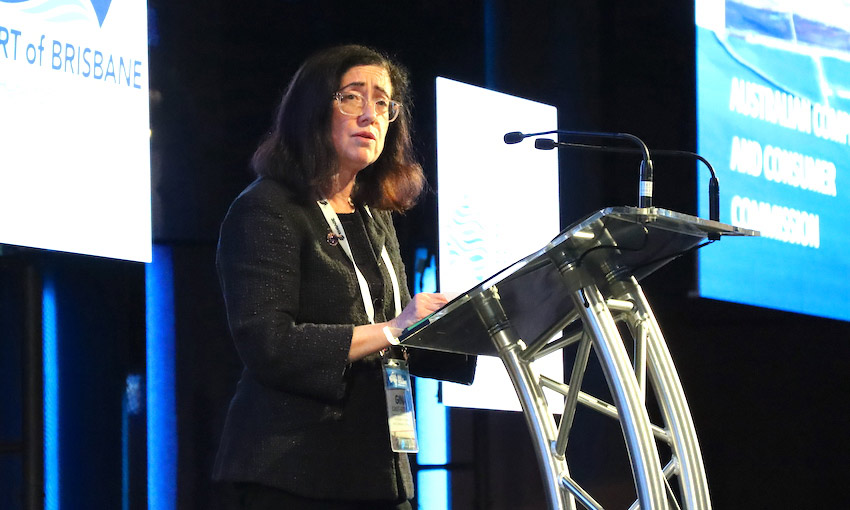DAY two of the Ports Australia Biennial Conference featured presentations from the Australian Competition and Consumer Commission and the Productivity Commission, considered by many as highlights of the event.
Thursday 1 September was the second and final day of the industry conference, which took place at hotel W Brisbane. The theme of the conference was “Risk and Resilience”.
The morning commenced with an opening address from Bridget McKenzie, shadow minister for infrastructure, transport and regional development.
Her presentation was followed by the ports and maritime sector sustainability panel, featuring discussions between Jason Sprott, director of Sprott Planning and Environment; and Peter Creeden, managing director of MPC International.
Moderated by NSW Ports CEO Marika Calfas, the panel explored different approaches to sustainability and the many aspects of it.
A major discussion point was the shift to alternative fuels, which Mr Creeden said would be the next source of disruption in the industry.
“Forty per cent of the world’s vessel fleet will have to be phased out by 2030; they are no longer fuel efficient to meet expectations,” he said.
Mr Creeden highlighted the debate around which alternative fuels are safer and more sustainable, while different shipping companies back different fuel sources.
He said in 2020 less than 7% of vessels were being built with alternative fuels, whereas today, 20% of the newbuilds coming out of shipyards are going to have alternative fuels.
According to Mr Creeden, in two years’ time the number of newbuilds delivered to support alternative fuels will reach 50%.
Shifting focus as the morning progressed, Gina Cass-Gottlieb, chair of the Australian Competition and Consumer Commission, told conference delegates the industry had gone from being virtually unnoticed by the general public to experiencing highly visible delays and challenges.
She then drew attention to another “invisible” but essential part of the economy: competition.
“Competition is the key driver of firms’ incentives to realise efficiencies including reduction in costs and improving services,” Ms Cass-Gottlieb said.
She said the ACCC interacts with waterfront and shipping in two main ways. Firstly, the Competition and Consumer Act 2010 governs how businesses – including ports – deal with competition, suppliers and customers.
Secondly, and more directly, the ACCC plays a role in monitoring and reporting on the prices, costs and profits of container stevedores.
“The major disruptions in 2021 were driven by a combination of worldwide factors including port closures and reduced staff, government restrictions and the pandemic driving a surge in consumer demand towards containerised cargo,” she said.
“As many of you had first-hand experience of challenges to manage, this created a logistical set of extreme challenges for the industry.”
Commissioner Stephen King of the Productivity Commission then delved into a talk on the forthcoming draft report into Australia’s Maritime Logistics System.
Dr King is one of two commissioners leading the current productivity inquiry. The long-awaited draft report is scheduled to be released on 9 September.
Though unable to disclose the draft report’s findings ahead of the release date, Dr King outlined an array of concerns participants had raised with the Productivity Commission.
They related to performance in Australia’s ports, impacts on consumers and industries, workforce issues, infrastructure and technology.
Dr King said several reports and inquiries had been carried out in the maritime space over the past few years, such as the ACCC Container stevedoring monitoring report 2020-21.
The final session of the conference was a stimulating panel on supply chain efficiency, moderated by Ports Australia chair Stewart Lammin.
The discussion was between My Therese Blank of AP Moller – Maersk; Andrew Adam, CEO of DP World Australia and Andrew Johnson of the Department of Infrastructure, Transport, Regional Development, Communications and the Arts.
The conference concluded with further conversations over lunch, fuelled thoughts and perspectives formed and challenged over the past two days at the Ports Australia conference.
DCN will expand on its coverage of the ACCC and Productivity Commission presentations in an additional, dedicated article this week.

